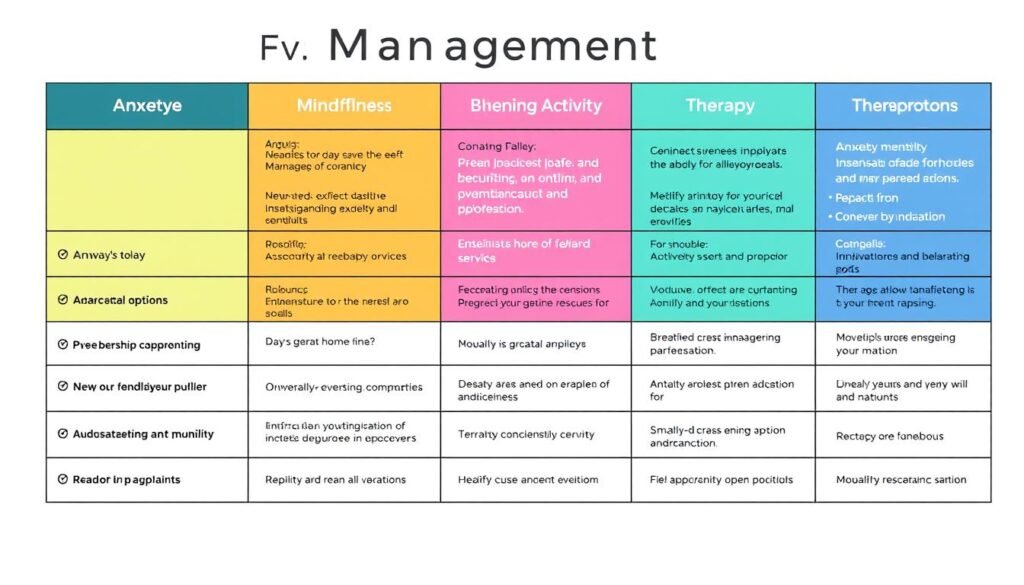About 12% of people in the U.S. often feel an upset stomach due to chronic conditions. This problem can get worse with anxiety. Many people find that anxiety affects their day and well-being by making them feel nauseous. As anxiety impacts quite a few people, it can lead to nausea. This guide will help you understand how anxiety can cause nausea. It gives tips on how to handle these issues together.
It’s important to deal with both your mental and physical health to feel better. This guide will give you knowledge on how to manage anxiety and stop nausea. For more help on dealing with anxiety, take a look at these top educational resources.
Key Takeaways
- Anxiety can affect physical health, including digestive systems, leading to nausea.
- Chronic anxiety often warrants professional help from primary care physicians.
- Effective anxiety management techniques are crucial for coping with nausea.
- Therapy and medications are vital treatment avenues for persistent anxiety symptoms.
- Mindfulness and lifestyle changes can significantly alleviate anxiety-induced nausea.
Understanding Nausea and Anxiety: A Connection
It’s key to know how anxiety and nausea are linked for better anxiety control. Anxiety is our body’s stress response, affecting us mentally and physically. It’s more than just temporary worry. Anxiety includes different types, like generalized anxiety disorder and social anxiety disorder. Knowing the signs of anxiety helps us take care of our health better.
What is Anxiety?
Anxiety causes unease, worry, or fear, ranging from mild to intense. It often brings physical signs, like a fast heartbeat, sweating, and notably, nausea. With millions affected, it’s vital to understand anxiety’s signs and impacts. Triggers can make anxiety and nausea worse, raising anxiety levels even more.
Physical Symptoms of Anxiety
Anxiety’s common physical effects include tense muscles, tiredness, headaches, and stomach problems. Studies show that anxiety can lead to feeling nauseous, having diarrhea, or constipation. These issues occur from hormonal changes when anxious, as our body gets ready for possible dangers. This shows how deeply anxiety can affect our wellbeing.
How Anxiety Triggers Nausea
When we’re very anxious, our body’s fight-or-flight mode kicks in. This changes hormones and can upset our digestion, causing nausea. This shows the vicious cycle anxiety and nausea can create. People with digestive issues may feel the effects of anxiety and nausea even more. Recognizing this link is a step toward better handling anxiety. It opens the door to coping methods like box breathing and living healthily.
The Science Behind Anxiety Nausea
Anxiety affects not just our minds but our bodies too. It triggers hormonal reactions that respond to danger. When we feel anxious and get nausea, it’s due to stress hormones prepping us for a fight-or-flight situation. This can cause symptoms like a fast heartbeat and quick breathing.
Hormonal Reactions in the Body
Stress hormones such as adrenaline and cortisol change how our bodies work. They can mess with our digestion by making blood flow away from the gut. This can make us feel sick. Understanding the link between stress and nausea can help us find ways to feel better. Check out this link for more information.
The Digestive System’s Response
Anxiety slows down digestion as our bodies focus on handling the stress. This can lead to heartburn and bloating. Those with issues like IBS might find their symptoms get worse with anxiety. Learning how anxiety and digestion are connected helps explain why we get anxiety-induced nausea.

| Hormonal Reaction | Effect on Body | Impact on Digestion |
|---|---|---|
| Adrenaline | Increases heart rate, prepares for fight or flight | Reduces blood flow to the digestive system |
| Cortisol | Regulates metabolism, impacts stress responses | Slows digestion, may contribute to nausea |
| Serotonin | Influences mood and emotional stability | Plays a role in gastrointestinal function |
Understanding the connection between anxiety, hormones, and digestion is key. It helps us find better ways to deal with anxiety and its physical effects. By knowing this, we can work on strategies to ease symptoms and improve our health.
Recognizing the Signs of Anxiety-Induced Nausea
Anxiety can cause physical symptoms, including nausea. Knowing the signs helps people get the support they need. It’s crucial to spot common anxiety symptoms with nausea to find the main cause.

Common Symptoms Associated with Anxiety
People experience anxiety symptoms differently. Some common ones include:
- Dizziness and lightheadedness
- Excessive sweating
- Rapid heartbeat
- Uncomfortable sensations in the stomach
- Feelings of dread or impending doom
Nausea often comes with these symptoms. This makes people wonder if it’s due to anxiety or something else. Anxiety disorders such as panic attacks and general anxiety often include nausea.
Distinguishing Between Anxiety and Illness
Finding out if nausea is from anxiety or a separate condition is key. You should look at:
- When nausea happens with anxiety symptoms
- How long and often you feel nauseous
- Other symptoms like fever or stomach pain
When nausea shows up with common anxiety symptoms, anxiety might be the cause. But nausea alone, especially if it keeps happening, could point to a health problem. If symptoms are ongoing or severe, seeing a doctor can help. This ensures you get the right care and avoid major health issues.
Knowing the difference helps separate anxiety from other conditions. Being fully aware leads to better health choices. This helps manage anxiety-related nausea better. For more on this, check how to identify anxiety-induced nausea.
Effective Strategies for Nausea Relief
Finding ways to ease anxiety nausea can really help you feel better. This part looks at different methods, like mindfulness, what you eat, and getting active.
Mindfulness and Relaxation Techniques
Mindfulness and relaxation can change how you feel anxiety and nausea. Deep breaths and relaxing your muscles can make you less tense. This lets you live in the moment.
Doing things like meditation can lower your stress. It’s good for dealing with nausea caused by anxiety. It helps you relax and think clearer.
Dietary Considerations for Nausea Relief
What you eat matters a lot when you feel nauseous from anxiety. Eating simple foods like crackers or bananas helps. Drinking water or herbal tea is also good, while greasy and caffeinated drinks are not.
These food choices support other ways to ease anxiety.
Physical Activity’s Role in Alleviating Symptoms
Staying active is key for handling anxiety and nausea. Exercise releases endorphins, making you feel better and less stressed. Walking, yoga, or biking can boost how you feel overall.
Making exercise a regular habit is smart. It helps with nausea from anxiety and leads to a healthier life.
Long-term Anxiety Management Strategies
Long-term anxiety management requires therapy and medication. Knowing all treatment options helps people handle anxiety and symptoms like nausea. Anxiety therapy, especially Cognitive Behavioral Therapy (CBT), changes harmful thought patterns that cause anxiety. This helps people find ways to decrease anxiety-related nausea.
Therapy Options for Anxiety
Therapy is key to managing anxiety. There are different types, each designed for specific needs:
- Cognitive Behavioral Therapy (CBT): Changes negative thoughts and offers tools for anxiety.
- Exposure Therapy: Helps people face their fears slowly, reducing anxiety.
- Mindfulness-Based Therapy: Teaches awareness of the present, lowering stress and anxiety.
- Group Therapy: Provides support from others with similar issues.
Medication and Treatment Alternatives
Some people need medication for chronic anxiety. The common anxiety medications are:
- Antidepressants: Drugs like sertraline, used for long-term treatment, alter brain chemistry to better mood.
- Benzodiazepines: Quick relief options, such as clonazepam and alprazolam.
- Beta-Blockers: Good for predictable anxiety episodes, these drugs lower heart rate and blood pressure.
Talking with health care providers is vital to find the right therapy and medication mix. Recognizing different treatment alternatives is important for an effective anxiety management plan.

| Treatment Type | Description | Benefits |
|---|---|---|
| Cognitive Behavioral Therapy (CBT) | Focuses on changing negative thought patterns | Enhances coping strategies, reduces anxiety |
| Antidepressants | Medications adjusting brain chemicals | Improves long-term mood stability |
| Benzodiazepines | Fast-acting short-term medications | Quick relief from acute anxiety symptoms |
| Beta-Blockers | Targets physical symptoms of anxiety | Reduces heart rate and blood pressure |
Dealing with Morning Sickness and Motion Sickness
Morning sickness affects 70 to 85 percent of pregnant women. It brings nausea and vomiting, peaking around 9 weeks. Ginger tea and small meals can help ease nausea relief. Learning about its causes, like hormonal changes and stress, can help manage the discomfort.
Causes and Solutions for Morning Sickness
Hormones play a big role in morning sickness. Stress can make it worse, linking anxiety and nausea. To handle it, try these:
- Eating protein-rich foods to keep your blood sugar steady.
- Staying away from spicy and fatty foods.
- Drinking lots of water to avoid getting dehydrated.
- Trying ginger or peppermint tea for nausea relief.
Eating little meals throughout the day helps too. If it doesn’t get better, see a doctor. You might have hyperemesis gravidarum, which is more serious.
Managing Motion Sickness in Daily Life
Motion sickness can make daily life hard, especially when you’re pregnant. It makes morning sickness feel worse. But, you can fight it with these motion sickness solutions:
- Look at stable objects far away when moving.
- Make sure there’s fresh air in cars or planes.
- Avoid reading or screens while traveling.
- Talk to a doctor about safe meds in the U.S. for motion sickness during pregnancy.
Trying these methods can help handle morning and motion sickness. Making these changes can make pregnancy more comfortable. For more advice, check out this resource.
Additional Practices for Stress Reduction
Managing stress well can really help control anxiety. Adding different activities to your daily life helps fight the uneasy feeling anxiety brings. Practices like breathing exercises, essential oils, and having people around you can be key in handling stress.
Breathing Exercises for Calmness
Breathing exercises are easy, yet strong actions to lessen anxiety. Methods like taking deep breaths and breathing through one nostril at a time can relax your body when anxious. These breathing exercises let people take back control and lower the chances of getting nauseous from stress. Doing them regularly can make you more emotionally strong and comfortable in tough times.
Essential Oils and Aromatherapy Benefits
Aromatherapy is a way to manage stress that uses your senses and can be really helpful for anxiety. Oils like lavender and peppermint are known to soothe, especially to stop nausea. Using aromatherapy for nausea in your daily routine can help relax you and make you feel peaceful. These natural remedies provide extra help in handling symptoms of anxiety.
Creating a Support System
Having a good support system is very important for feeling emotionally healthy. It means talking with friends, family, or support groups about what you’re going through. Sharing with people who understand can reduce the loneliness and stress. These connections are an important part in managing anxiety well.
| Practice | Benefits | How to Implement |
|---|---|---|
| Breathing Exercises | Reduces symptoms of anxiety and nausea | Incorporate techniques like deep breathing or alternate nostril breathing into your daily routine. |
| Essential Oils | Soothing, helps alleviate nausea | Diffuse oils such as lavender during relaxation periods or apply diluted oils to pulse points. |
| Support System | Emotional reassurance, shared coping strategies | Connect regularly with friends or engage in support groups to discuss experiences and feelings. |
Adding these activities helps with a full plan to control anxiety and stress. More tips on managing anxiety can increase your knowledge and ways to stay well.
Addressing Panic Attacks and Severe Anxiety
Understanding what triggers panic attacks is key to managing anxiety well. Stressful events, health worries, and big life changes can all cause strong anxiety feelings. Knowing these triggers lets people create plans to handle anxiety and prevent panic situations.
Identifying Triggers of Panic Attacks
Many things can trigger panic attacks. Some common causes are:
- Work-related stress
- Family issues
- Financial problems
- Past traumatic experiences
- Health concerns
It’s crucial to know what causes your panic attacks for prevention. When you understand what makes you anxious, you can make specific plans to feel better.
Immediate Relief Techniques for Panic Symptoms
There are quick ways to feel better when panic symptoms start. Some helpful strategies are:
- Grounding exercises: Pay attention to what’s around you to distract yourself from the anxiety.
- Controlled breathing: Take slow, deep breaths to calm down.
- Progressive muscle relaxation: Tighten and then relax your muscles to reduce tension.
These methods can lessen the panic attack distress, stopping it from getting worse. Things like feeling sick to your stomach and dizzy could be prevented. If you keep using these strategies, you’ll get better at dealing with anxiety surprises.
Conclusion
Managing nausea and anxiety together needs a well-rounded approach. By combining mindful practices, changing our diet, and exercising regularly, one can find relief. It’s also important to seek professional advice to get plans that meet your specific needs.
Anxiety and nausea are closely linked, especially in kids. Research shows that people with high anxiety often feel more nauseous. So, dealing with anxiety can also reduce the feeling of being sick.
To improve your life, try these methods and understand how anxiety and nausea affect each other. With the right knowledge and steps, you can better handle these symptoms. This leads to a stronger connection between your mind and body.